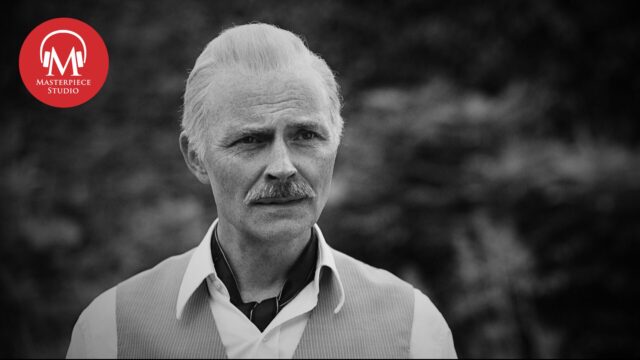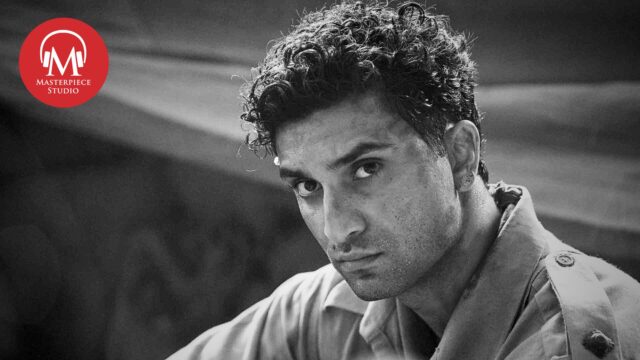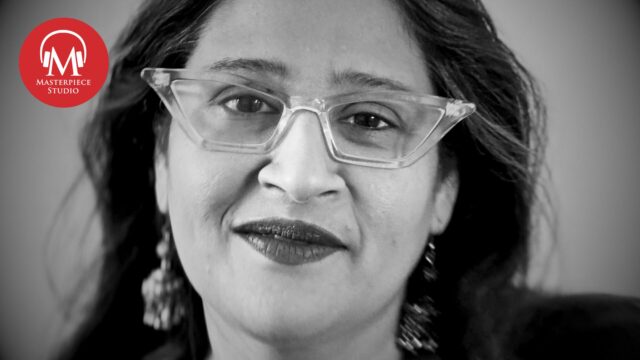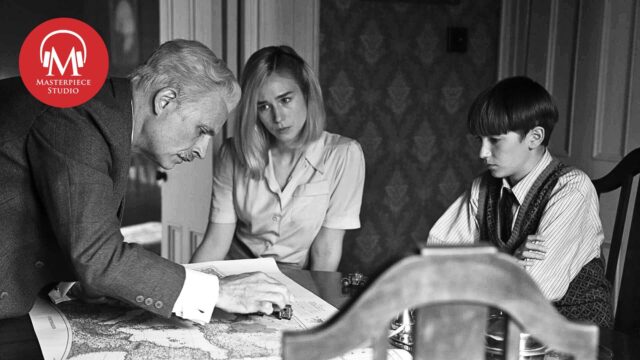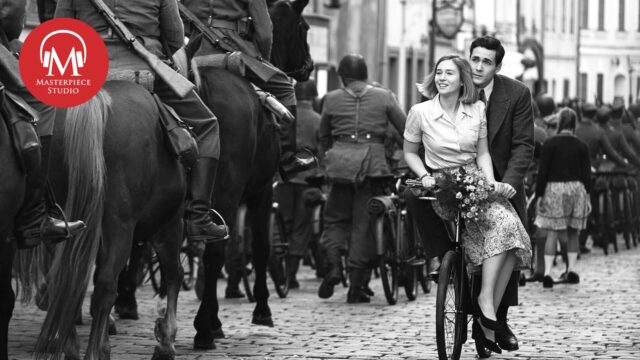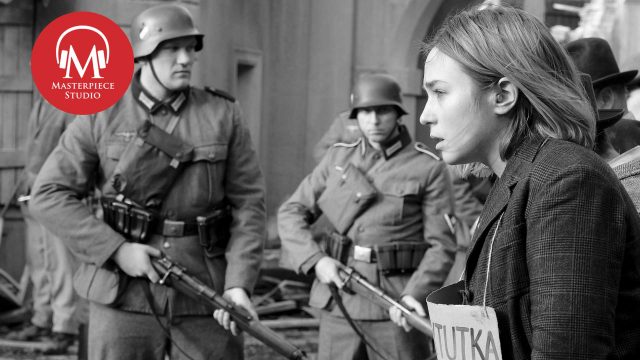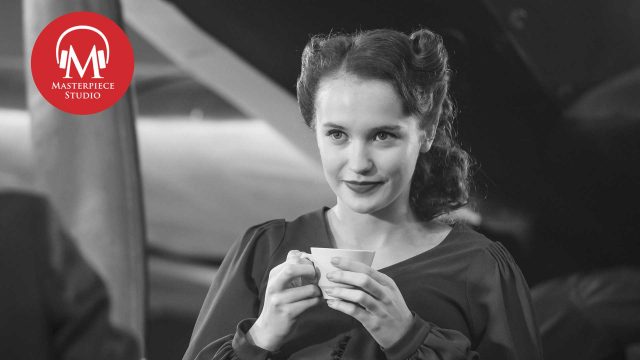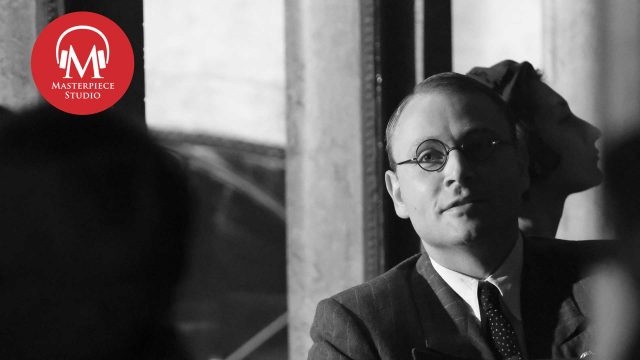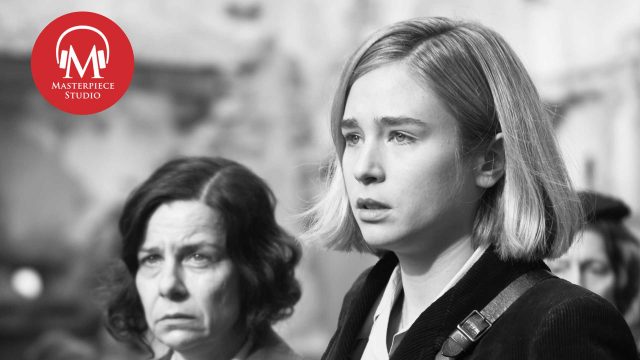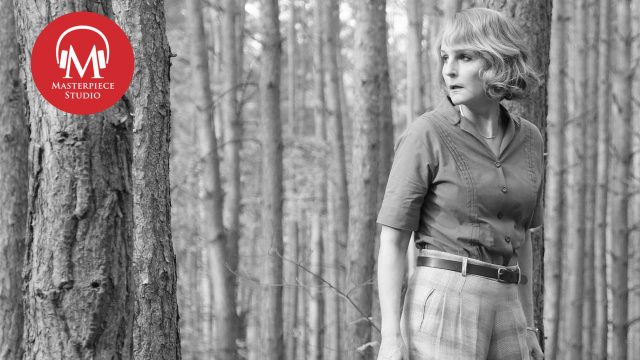In the international cast of World On Fire, Nancy Campbell and her nephew, Webster O’Connor, are two Americans facing the perils of a looming war. Actor Brian J. Smith found something of himself in the romantic character he plays on the series, and he shared stories from set in a new interview.
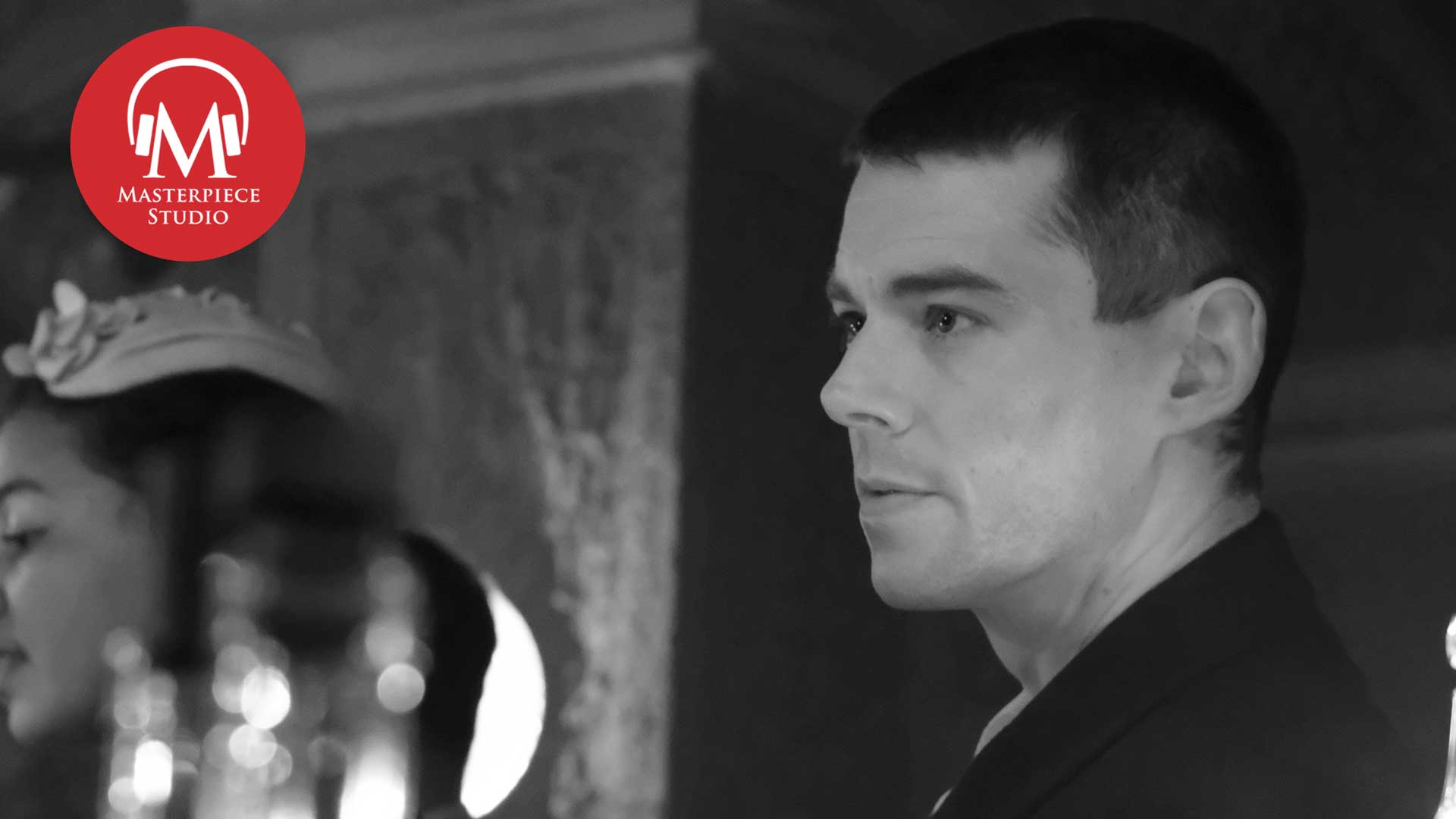

Brian J. Smith’s American In Paris Helps Ground Global Drama
Released 33:04
Related to: World on Fire, Season 1
Download and subscribe on: iTunes | Spotify| RadioPublic
Transcript
Jace Lacob: I’m Jace Lacob, and you’re listening to MASTERPIECE Studio.
Dr. Webster O’Connor has been our American in Paris these past six episodes of World On Fire, but his life in recently occupied Paris is anything but idyllic.
CLIP
Henriette When will we smuggle another prisoner out?
Webster When we heard that the Englishman made it…
Henriette Under the Nazis noses. Even after they take over the hospital.
Webster The Germans have promised this place won’t be requisitioned.
Henriette And a Nazi promise is worth what, exactly?
Jace The closeted doctor has seen his hospital overwhelmed by fleeing French soldiers and British POWs, and discovers his secret lover, French jazz saxophonist Albert Fallou, has been imprisoned in a Nazi internment camp.
CLIP
Webster I can’t do this. What happened? How has this happened?
Albert What happened was I objected to my home being invaded. What happened was that I was black and French and what happened was they can do what the hell they like.
Jace But O’Connor refuses to give up his rosy vision of Paris.
CLIP
Albert You still think this is all going to be fine?
Webster I think the Germans love Paris. And clubs like yours are one of the reasons…and you’re a French citizen…
Albert Not as far as the Nazis are concerned. I heard two boys from Frankie’s band got picked up last night.
Jace The role of a closeted Texan abroad echoed for actor Brian J. Smith, who saw some of his own story in the seventy-year-old fiction presented within the narrative of World On Fire. The rapidly up-and-coming actor joined us to discuss Webster’s double life, the beautiful demimonde of pre-war Paris, and the slow journey of discovering yourself.
A listener note — due to ongoing international shelter-in-place quarantine orders related to the spread of COVID-19, the audio arrangements for this episode differ slightly from our usual setup. We’re grateful to Brian, and to all of you, for sticking with MASTERPIECE in these unusual times.
Jace We are joined this week by World on Fire star, Brian J. Smith. Welcome.
Brian Thank you very much.
Jace I’ll just briefly touch on the weirdness of this. I’m currently recording this in my pantry in Los Angeles. You are in Berlin, under lockdown as well. This is a strange situation. Looking at World On Fire through the prism of this pandemic, does it resonate even more sharply now?
Brian Oh, you bet it does. I’ve actually been thinking a lot about the show the last couple of weeks when all this started happening. I really can’t believe the parallels here. This was, when we filmed this, it just was unimaginable that by the time the show got to the United States that we would be in this insane, tragic moment together. And, you never know what’s going to happen when you make a show. You just hope it goes out and resonates. But I think a show about the first year of World War II, with all these people are scrambling to figure out how they’re going to adapt to this new reality. It’s never been more relevant than right now in ways that are really unfortunate. I really wish the show was not so relatable as it is right now.
Jace It is scarily so, I’d say. We’re introduced to Webster through the incongruity of his two worlds, the freedom of the jazz club and the constricted aura of the hospital. What do you make of the two sides of his life? Obviously, you played the pansexual will on Netflix’s Sense 8, and a gay man in Hate Crime. Webster’s gay. You recently publicly came out yourself. How was playing Webster O’Connor part of that journey for you? And how does it relate to your own background growing up in Texas?
Brian Well, it’s funny…I’m not someone who necessarily gets to pick and choose my jobs. You know, they, I have to audition and really go in there and fight for these things. And for some reason, these kinds of roles keep coming my way. And I think I’m sure it’s got everything to do with the fact that, you know, that I am myself gay and and particularly with Webster, I grew up in Texas, although I would imagine growing up in Texas in the 1980s, is a lot different than it was in the 1920s and 1930s. But I think there’s just a kind of spiritual affinity that you have with someone like that. And, you know, and certainly someone like Will from Sense 8. You know, he was, at least thought he was straight and ended up finding out there, like you said, he was most likely pansexual. I think I prefer playing those kinds of roles to the more buttoned up kind of straight guys that I’ve played in my career. It just feels more personal, and more fun.
Jace The script for the first episode — Peter Bowker refers to Webster stumbling out of the club into the Parisian sunlight as “looking like a beautiful corpse.” What do you make of that description, and what were your initial thoughts about the character going into rehearsals?
Brian Well, I did have a couple of discussions with them when we were on set about my own experiences in Berlin. We came to Berlin the first time — I think I was 32 or 33 to film the first season of Sense 8, and I had never experienced the night life that they have here anywhere like that in the world before, it was a completely new, shocking experience to me, and I definitely did learn from firsthand experience what it was like to stumble out of a club very early in the morning. I’m not sure if I was a beautiful corpse, but I probably looked a little rough for sure. But that was a fun aspect of Webster that I liked, was this guy who’s probably for the first time in his life having fun and really getting to be who he is. Sometimes, we have to go to these foreign countries in order to find ourselves. We have to completely leave behind our old identities in order to get to a closer truth of who we really are. And I think that’s definitely where Webster is in the first episode.
Jace I mean, given the sense of freedom and identity that you mentioned, it’s it’s not a surprise that he doesn’t want to give Paris or Albert up. Does the start of the war change that for Webster or does it strengthen his resolve to be his true self?
Brian Well, both, I think. I would imagine growing up the way that Webster did, that there was there’s a great deal of helplessness, you know? I mean, you can’t fight your family. You can’t fight the church and the school system that brought you up and educated you. You know, you’re just trying to survive those things. I always thought that once the Nazi menace really started to materialize and started to threaten Paris, someone like Webster would actually be pretty energized by it because finally you have an enemy. Finally, you have someone to fight. And that’s something I really admired about Webster is that he had a lot of fight in him. He doesn’t shy away from it or, you know, run away and go back home to Texas. He he sticks it out. And, of course, you know, having someone like Albert in his life, he’s got someone he loves who he also has to fight for. And I think that’s just something about Webster that I always really admired and it was fun to play.
Jace How would you describe the dynamic between Webster and Helen Hunt’s Nancy Campbell, his aunt, given how similar these two seem to be to each other?
CLIP
Nancy: I am telling you, Webster, you need to get out of Europe. I can’t see what’s so hard to understand. Webster?
Webster: I can hear you, Auntie Nancy. And I love that you bothered to call. But, please. Paris is safe! I love my work. I’ll bet you’re not leaving Europe!
Nancy I’m based in Berlin. That’s my job. You can work anywhere. Just go home!
Webster: You know that isn’t going to happen, Auntie Nancy, we’ll always be alike, you and me!
Brian Yeah, they’re definitely kindred spirits in a way. I mean, I always imagined that growing up, having someone like his aunt who was out there in the world, in really interesting locations also, you know, probably in dangerous places, she probably gave him a certain amount of wanderlust and the desire to see the world. In a lot of ways he hero-worships her, and definitely saw her as a role model. But yeah, she’s also a bit of a chilly woman. She’s not the most personable, easy to get to know person. And I think he always felt the distance, but always hoped he would be able to bridge it a little bit. And it’s just interesting how the circumstances of World War II, you know, it didn’t necessarily bring them closer together, but it puts them on an interesting collision course, especially in the later episodes.
Jace I mean, I won’t spoil the specifics about that, but you do finally get to appear on screen with Helen Hunt in the final episode as the war moves to Paris. What did Helen bring to those scenes together and what was it like working opposite her?
Brian It was great. I mean, I was definitely around and thinking about being an actor when Helen Hunt was doing these incredible films. I mean, there was this period of time where Helen was in everything. I mean, I remember going to see a movie starring her, and I think two of the previews of the movies that were about to be released later that year, she was also in. I mean, she was ubiquitous, right? So to get to work with someone like that was pretty cool. She’s very professional and she’s not messing around on set. You got to be ready to go. And, you know, you can’t…just don’t don’t waste Helen’s time. You’ve got to be ready. But also, you know, she’s very warm and very friendly.
Jace I want to look at the first episode. With Webster and Albert’s meet cute, as it were, the worlds of the nightclub and hospital collide. Albert needs help mending his wound. And Webster is a surgeon.
CLIP
Albert You have done this before, right?
Webster Only about a thousand times.
Albert Sorry. I get nervous around my good looks. It’s all I have.
Webster That and the fact you play sax like nobody else I’ve ever heard.
Albert Well that might mean good or bad, Webster.
Webster Oh good, definitely good. You’re wonderful.
Albert Is that why you’re at the club every night? For the music?
Webster Yes. Of course. Yes.
Albert Right. Because the way you look at me. The way you talk to me. The way you’re so nice to me right now when you hardly know me. It kind of feels like you might have a bit of a, I don’t know, a passion…
Webster A passion?
Albert For me. Not just the music.
Jace Does the physicality of that scene heighten the sexual tension between the two of them?
Brian There’s definitely a lot of sexual tension between them. I mean, I think that in some ways they’re both exotic to the other. You know, I mean, certainly for Webster to meet someone like Albert who’s of African descent. He’s French. He’s a jazz player. This is all so out of his, I wouldn’t say comfort zone, but just, he had never encountered anybody like that before, growing up. And I would imagine for Albert, too, someone like Webster is this kind of fish out of water, very American guy. And there’s something about that dynamic actually that works. They’re such opposites. But that really makes for a really hot dynamic between the two of them. I mean, it’s constant. You can just tell that they just want to go for it. When they’re there…but they wait. They wait until it’s appropriate.
Jace How much time did you have with Parker Sawyers in terms of rehearsals to get at that dynamic between these two men?
Brian Quite a bit. We both arrived a couple of weeks, I think, before we started filming. And we were able to attend some rehearsals together, work on some scenes. Adam Smith, who directed the first episode we got to meet with him and sort of start to work out the physicality and the scenes. And that was very helpful. I mean, any time you get to rehearse, it’s a luxury. Usually just show up and you shake hands and you go for it. We also spent a lot of time just walking around Prague, which is such a beautiful city. And it was just the joy of walking around Prague with with him and getting to know each other in that way, surrounded by all this beautiful architecture. And it was magical.
Jace This week’s episode finds Webster and Albert in danger for a multitude of reasons. We’ll start first with Webster, who gives Lois’s brother Tom a blood transfusion and hatches a daring escape plan. Is this bravado here just Webster’s American can-do spirit?
Brian Yeah, that’s. That’s interesting, I mean. Well, I do think yes, there’s something about the, I would almost say the arrogance of Americans. And I don’t mean that in a bad way. But back then, you know, when the war was getting started and you have to remember to at this point, this was before Pearl Harbor and this was indeed the American hospital. And the Nazis were very careful not to provoke the Americans. They did not want America in that war. The last thing that they wanted to do. So there is a certain sense of, yeah, arrogance in terms of, you know, flouting the rules and doing what you had to do to help these, you know, clearly desperate soldiers who were trying to find a way out of France. So…and this actually did happen. There were doctors, American doctors and French doctors who did everything they could to secretly spirit away British and French soldiers in some instances out of the country and get them out of there before the whole country was overwhelmed by the Nazis. So that’s that’s that’s actually a true story, that really happened.
Jace Albert reads the jazz rules out loud to Webster, who seems to not take them very seriously.
CLIP
Albert: “On no account will Negroid excesses in tempo (so-called hot jazz) or in solo performances (so-called breaks) be tolerated;”
Webster I read it already.
Albert “Plucking the strings is prohibited, since it is damaging to the instrument and detrimental to Aryan musicality.”
Webster It’s laughable. Nobody will take it seriously.
Jace Is this optimism or naivete at play? Where is that coming from, within Webster?
Brian Well, it’s also, in a way, very practical. I mean, yes, you know, in hindsight, when you look back on, you know, certain decisions people would have made in those circumstances. Yes, it does appear very naive. Yes, it does appear very arrogant. However, no one had a crystal ball. No one no one knew that it was going to get as bad as it was, even though there were people like Helen Hunt’s character who were, you know, ringing the alarm bells and saying, listen, listen, this is coming and it’s going to be worse than any of you thought it was possible for it to be. There was just no reason for a lot of people to believe that that was going to be true. And Webster really represents a lot of people. The way they react in a crisis like this, which is this is this is you don’t want to get hysterical. You know what? The economy’s going to be up in two weeks. If I can. We can have everyone to get back to work by Easter. You know, it’s this odd thing. It’s this lesson that we don’t seem to learn. When these things are coming at us, we just don’t believe that it’s possible for it to get bad. And it just, you know, like maybe this time we’ll get it. Maybe. Maybe this time I’ll learn the lesson. But I don’t know. We didn’t learn it after World War II, either.
Jace Before this next question, let’s take a quick break to hear a word from our sponsor…
Jace I want to talk about the scene in Webster’s flat when he comes home to discover that it’s been commandeered by Nazis, and he’s completely powerless to stop them.
CLIP
Webster What’s going on? This is my home! Can somebody tell me what is going on here?
German Officer: LAUGHS
Jace Given the subtext and danger that’s at play here, there’s a literal gun to his head, how fraught was this scene to shoot?
Brian Well, Chanya, our director of that episode, actually came to me. I was, I think I was eating lunch or dinner at that point. It kind of late in the night. I think we shot that scene last up on that day’s schedule. And she came up to me and she was like, ‘Listen, this is gonna be hard. I know you know, this, it’s got to be a pretty emotional moment.’ And she goes, ‘I don’t want to rehearse it. I’m just gonna tell you where you’re going to walk, where you’re gonna go. We’re gonna have the cameras on and we’ll just kind of see what happens.’ So pretty much that scene is you’re actually watching me walk into that room for the first time and just this like it’s like a Bosch painting, you know, like this Nazi orgy happening kind of in his apartment. And it was really fun to be able to do that and have no idea really specifically what I was going to see in that room. And I think it really helped me get to a certain place emotionally. Aw, yeah, it was harrowing. And, you know, the thing you always have a hard time with in scenes like that is your imagination kind of gets stuck. You know, you’re like, ‘I can not, I can’t imagine what that would be like.’ I mean, you’re like ‘What, well, what would that feel like? What would I do?’ And I think I think Chanya knew that and decided not to overwork herself so that I could have that fresh experience so that without overthinking yet and getting stuck in my head about it. But that was yeah, that was a tough one to shoot, but tough in that way that actors love. You know, it was a big emotional moment. And those are fun to do.
Jace Webster learns that Albert has been arrested from Sieber. What do you make of this somewhat sympathetic Nazi character and the fact that he’s helping Webster? Do you feel that there is a flirtation between the two of them?
Brian Well, I definitely think that Sieber was pretty clear that he himself was homosexual. And it’s funny, there’s and my readings in my research for the for the project that really and I uncovered a lot of different instances of of homosexuality and the Nazis. Actually, it was it’s it’s an oddly homoerotic ideology. It’s just this worship of like the ideal male. And, you know, very I’m sure a lot of them had these very confusing sexual feelings for one another. I was such an odd and also misplaced sexuality as well. But in Seber’s case, he added that he’s a. He’s a great character because not all the Nazis are mustache twirling villains. You know, they there were quite a few of them probably who had to join the Nazis to protect their own families or, you know, in their own way, they got caught up in that whole tragedy that was taking place in Germany at the time. So I thought that was a really brave and interesting choice to have him be someone who’s not only gay, but, you know, really does not like doing what he has to do. And also someone, you know, who was an arts lover himself, Sieber, this character was interested in jazz. So, yeah, those little touches, I think are part of what makes the writing on the show so interesting and give it a really fresh dynamic is just a way of looking at the war that we haven’t seen before.
Jace It also sort of humanizes evil in a way that makes it more approachable. As you say, it’s not sort of a mustache twirling villain in the traditional sense. He might have other allegiances, but it’s sort of trapped into participation.
Brian Yeah.
Jace And I think that that fits in with Peter’s entire notion of looking at ordinary people caught up in this conflict. And I think he’s a fantastic character to sort of explore. And I hope we see more of him.
Brian Yeah, me too. Me, too.
Jace Webster is insulated from a lot by not only his nationality, but the color of his skin. The scene where he goes to visit Albert in the internment camp is really, really difficult to watch. Albert seems very much resigned to his fate and aware of the fact that Webster can just walk away at any time.
CLIP
Webster I will get you out of here.
Albert Yeah. You said that.
Webster I know. I’m sorry. But I mean I can, I can get you out of here. Sieber. That German guy, at the club…
Albert Are you joking? I get out of here, it’ll be somewhere worse. So. Don’t stir things up. Okay?
Jace How challenging was this to shoot with Parker Sawyers, given what’s at stake for these two characters here?
Brian Well, I remember, I think we filmed those scenes a little bit sort of late, at least in my schedule. So me and Parker had had a lot of time together and we had filmed a lot of things together and were able to have a good sense of what this relationship was like. You know, what it was like to be held by him and how nice it was to be with him so that once the prospect of losing him was becoming real, it didn’t require a lot of acting. It was very sad. Also, we did film that scene in an actual Nazi labor camp in Czechoslovakia. So it was very spooky to say the least, to be standing on those grounds and you know, in my imagination, seems like that really took place thousands of times. You know, people desperately trying to get their loved ones out, not knowing, you know, what was going to happen. I don’t know, it was very, very, very haunting. Being there, it was also again, it was very cold. And there’s something about, you know, cold air. It just hits your face in a certain way and it pinches your eyes and your skin and it all that contributes to. I think the desperation of that scene. It was a tough day. I mean, I think I probably I was crying pretty much nonstop for eleven or twelve hours in the cold.
Jace Albert tells Webster, ‘What happened is that I am black and French. Don’t stir things up.’ Does Webster fully comprehend the situation? Is does he see this as something he can fix? And in a larger sense, as both a surgeon and a person, is that ultimately Webster’s M.O. to fix everything?
Brian Absolutely. And that’s. And it’s also, that’s the American way. You know, we rarely meet a problem or a war or a bureaucratic official that we cannot overwhelm with our Americanness. I really don’t think that he does get it in terms of, you know, Albert’s race and the problem that that creates for him. It’s just, you know, even though Webster did have a difficult time growing up, being gay in Texas, and I think he also did see a lot of racism in Texas, probably from members of his own family. I don’t think that he believes that it’s possible in Europe, which he thinks of as this kind of idealized utopia in a way that he just cannot imagine that that that if that is not going to work out. It is just unconscionable to him and and he doesn’t really see. It just does not see how it cannot work out. And he sees. I think it makes his. When Albert rejects him in a way, or tells him to leave, to go, it makes it all the more shattering. It’s just you’re watching someone completely get inducted into a new reality in that scene. And it’s very difficult to watch.
Jace Webster is an American caught in a foreign conflict in a British television series. For American viewers, he and Nancy are sort of main points of contact. Did you have a sense as you approached the series that Webster would be a point of connection for American viewers?
Brian No, not really, I assume you. I guess I never. You know, you’re thinking about so many other things as an actor, you know. And if I don’t know, it’s hard it’s hard to know what the audience is going to be even. I mean, as far as we knew that this is really just gonna be in Europe. You know, I mean, we have like there’s such a great Polish story in the show. And I think Americans are going to be enlightened by the sacrifices that the Poles made, especially at the beginning of the war. You know, and there’s, of course, the, you know, the great British side of the story and the French side of the story as well. And I don’t know, we wanted to make something that was global. And to, you know, we weren’t trying to appeal to a specific audience ever. We just wanted to make it as universal as possible, because I think there were probably a lot of French people that, you know, could in some way the way to the American point of view. In this story, you know.
Jace What can you tell us about what’s coming up in this final episode of World on Fire?
Brian Well, the final episode is, is by that point, where the new reality has definitely been established, there’s no squirming away from what’s happening. And I think the last episode is when people really have to make a decision about if and then how they’re going to deal with the new world that they’re in. And then that, of course, hopefully sets us up for season two.
Jace You tend to play very hyper-masculine, heroic types, police officers, soldiers, sleeper agent assassins. I read that you said once, quote, “I tried to be that boy I idolized in high school,” in terms of those roles. What did you mean by that, exactly.
Brian I…people that know me, or who knew me when I was a kid, I think if they see me in any of these shows that I do, that they kind of cannot believe it because I was not the most athletic kid, didn’t have a lot of physical courage. It just is not my personality type at all. And. I think people get into acting often times because it’s like living out a fantasy sometimes, even if the character is going through something difficult or tragic, what we love to do as actors as is try to find the best version of ourselves or not the best version, but like an idealized version of ourselves. And I do think for me that those kinds of guys. I was always very intrigued by, and this idea of masculinity has been something that’s not bothered me, but it’s been like a tune in my head that I can’t get rid of, something I’ve always wanted to explore. Maybe because I’ve always felt so not a part of that kind of masculine culture. So maybe part of it is me wanting to just live as those guys to be in their skin for a little bit, in my own way.
Jace True or false: you nearly enlisted in the US Army and would have had you not received a phone call from your agents in the nick of time.
Brian Yes, that is true. I was having a pretty tough year after I graduated Juilliard. That first year out was really difficult and you know, that I didn’t have any insurance and I couldn’t get enough shifts at the bar I was working at. And I just thought, you know what? Maybe this isn’t meant to be. I’ve got a lot of military in my family, at least I can go do something for my country and my family will respect me. You know, as opposed to me just like, you know, bumming around New York, you know, asking people for money all the time to help me out, you know? So, yeah. I went and talked to the recruiter and was supposed to go in the next morning to meet him. He would take me down to Brooklyn to do the physical and take the little test and take the oath. And I called my agent and something that I had auditioned for that I didn’t think that I had gotten, I actually ended up getting it that night. So kind of. Yeah, it sent my life on a completely, completely different course. Things would have been a lot different. A lot different.
Jace Brian J. Smith, stay healthy, stay well, and thank you very, very much.
Brian Same to you. Be careful out there. And thanks for having me.
Jace With the global war no longer a distant possibility, the dangers for our characters rapidly stack up around the world.
CLIP
Kasia I still had a choice. And for my country, for the people, for my family, that was the right thing to do. But there was a price… and the price was the old Kasia.
Jace We’ll speak again to World on Fire star Zofia Wichłacz and series creator Peter Bowker, after the season one finale on May 17, here on the podcast.
MASTERPIECE Studio is hosted by me, Jace Lacob, and produced by Nick Andersen. Elisheba Ittoop is our editor. Rebecca Eaton is the executive producer at large for MASTERPIECE. The executive producer for MASTERPIECE is Susanne Simpson.
World on Fire Podcasts 11 More Podcasts
MASTERPIECE Newsletter
Sign up to get the latest news on your favorite dramas and mysteries, as well as exclusive content, video, sweepstakes and more.












